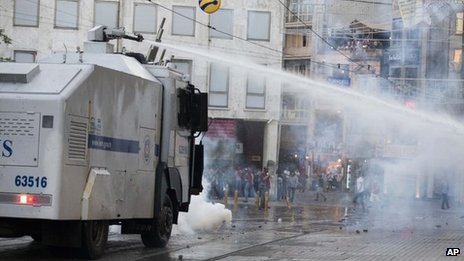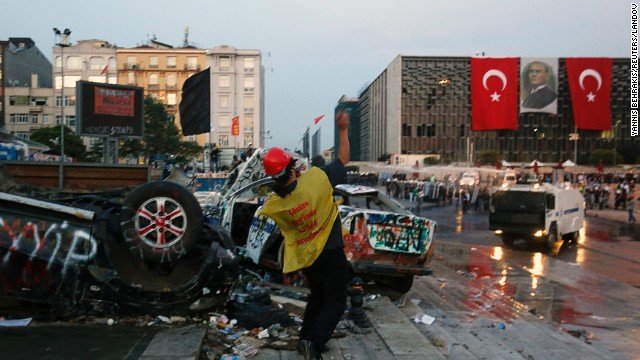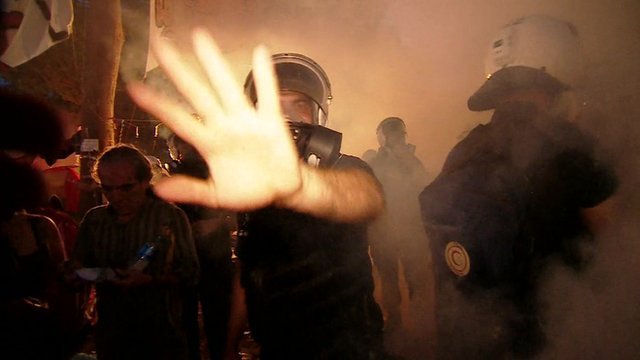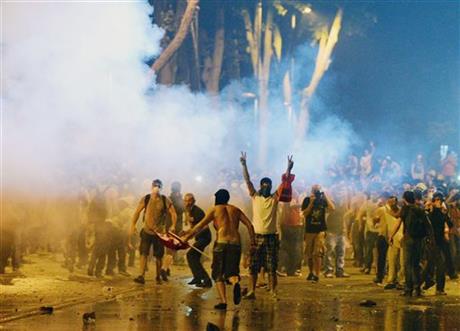Home Tags Posts tagged with "water cannon"
water cannon
Turkish riot police have fired tear gas and water cannon at protesters trying to enter Istanbul’s Gezi Park that was the focus of last month’s anti-government protests.
Istanbul’s governor reopened Gezi Park – next to Taksim Square – to the public earlier on Monday, but shut it again after protest leaders called a rally.
Gezi Park had been shut since June 15, when police ejected people occupying it in protest at redevelopment plans.
Turkish authorities’ response to the protest sparked nationwide unrest.
Four people were killed and thousands more were injured as police cracked down on anti-government demonstrators, who accused PM Recep Tayyip Erdogan of becoming increasingly authoritarian.
Hundreds of people flocked to Gezi Park on Monday afternoon after Istanbul governor Huseyin Avni Mutlu declared it open once again.
Huseyin Avni Mutlu said staff had tried to improve the park while it was sealed off, planting additional trees and shrubs and replacing damaged grass.
But, in a clear warning to protesters, he also warned that it was no place for “forums, occupations or marches”.

Turkish riot police have fired tear gas and water cannon at protesters trying to enter Istanbul’s Gezi Park
“Blocking the parks, making them areas for demonstrations, preventing children, elderly and [others] from using these areas and turning this into a security problem – we would never ever allow that,” he told reporters.
Taksim Solidarity, a group of political parties and non-governmental organizations, subsequently called a public meeting in the park at 19:00 (16:00 GMT), prompting the authorities to close it after only three hours.
Dozens of people were forced to leave by police, who used their shields to eject some who resisted.
Officers then used tear gas and water cannon to break up a crowd of several thousand people marching along Istanbul’s main shopping street towards Taksim Square, according to the Reuters news agency.
On Saturday, police prevented thousands of people trying to enter Gezi Park as part of a rally called by Taksim Solidarity to serve notice to the authorities of a court decision that annulled the redevelopment plan.
An administrative court said locals had not been consulted sufficiently about replacing the park with a replica of an Ottoman-era military barracks and a mosque, and that the work would not serve the public.
However, the ruling is not final and the government is expected to appeal.
[youtube _cHLhY-IOIU]
Gezi Park protesters have clashed with Turkish police in Istanbul, after riot squads used tear gas and water cannon to eject demonstrators from the park.
The protesters quickly fled the park, but later erected barricades across nearby streets and lit bonfires.
Witnesses said it was one of the worst nights of unrest since the park was occupied 18 days ago.
Police blocked off the Bosphorus Bridge to stop demonstrators reaching Taksim Square, where the park is located.

Gezi Park protesters have clashed with Turkish police in Istanbul, after riot squads used tear gas and water cannon to eject demonstrators from the park.
Clashes continued into Sunday morning in the streets around the square, eyewitnesses say. On the square itself, bulldozers went to work, clearing away the protesters’ abandoned barricades.
Thousands of people also took to the streets of the capital, Ankara, to express support for the protests.
The Confederation of Public Workers’ Unions (KESK) also said it would call a nationwide strike on Monday, while another union grouping is deciding whether to join the action.
Medical officials estimate that 5,000 people have been injured and at least four killed since protests began in earnest on May 31.
PM Recep Tayyip Erdogan is due to hold a rally in Istanbul later on Sunday.
The protests began as a local protest against a plan to redevelop Gezi Park, but snowballed into nationwide anti-government protests after the perceived high-handed response of the authorities.
[youtube F8rphu8nj1Y]
Turkish riot police have moved to clear the protest camp in Istanbul’s Gezi Park, using tear gas and water cannon.
Police began dismantling the tents that protesters had put up in the park.
The move came hours after PM Recep Tayyip Erdogan warned protesters to evacuate the area ahead of a rally by his AK party on Sunday.
Plans to redevelop the park sparked a wave of broader anti-government unrest and protesters had vowed to stay there until their demands were met.
In a show of overwhelming force, police advanced into the park wearing riot shields and gas marks.
Most of the protesters left of their own accord to avoid getting hurt, with some regrouping in nearby streets.
Local residents took to their balconies or leant out of windows banging pots and pans, while car drivers sounded their horns in support of the protesters, Reuters news agency reports.
Some of the protesters were reportedly receiving medical attention, several of them retreating into a nearby hotel.
Istanbul Governor Huseyin Avni Mutlu said 29 people had been injured in the raid, but none seriously.
Huseyin Avni Mutlu said only “marginal groups” had remained in the park.
“I won’t give up,” protester May Elbi told AFP.
“We’re angry, this is not over. The world has seen that together, we can stand up to Tayyip.”
There have been reports of fresh confrontations in Istanbul after the clearing of the park, with police again using tear gas to disperse protesters.
In the capital Ankara, thousands of people came out onto the streets to chant anti-government slogans.

Turkish riot police have moved to clear the protest camp in Istanbul’s Gezi Park, using tear gas and water cannon
Earlier, in a speech in Ankara, Recep Tayyip Erdogan told tens of thousands of AK party supporters: “If Taksim Square is not evacuated, this country’s security forces will know how to evacuate it.”
“Staying there [in Gezi Park] makes no sense anymore as the matter is now in the hands of the courts,” he told tens of thousands of cheering supporters.
“Nobody can intimidate us. We take no orders or instruction from anyone but God,” the prime minister added.
He also dismissed the wave of demonstrations as part of an organized plot against him.
One protest group responded to Recep Tayyip Erdogan’s speech by calling for another mass rally in Taksim Square. Istanbul is also set to host an AK party rally on Sunday,
On May 31, a crackdown on environmentalists in Gezi Park provoked protests across Turkey against the police’s actions and against Recep Tayyip Erdogan’s government.
On Saturday, the protesters vowed to stay there, despite a promise by Recep Tayyip Erdogan to halt the development plan for the park until a court ruling on the issue.
Last month, an Istanbul court issued an initial injunction against the plan to cut down trees in the park to make way for a shopping centre and replica 18th-Century military barracks. The government has appealed against the ruling.
Recep Tayyip Erdogan’s offer was presented as a major concession. But after discussions in Gezi Park on Friday night, the protesters said their movement was more than just a conservation protest and vowed to stay on.
Five people have died and thousands have been injured since the protests began.
Demonstrators have accused Recep Tayyip Erdogan’s government of becoming increasingly authoritarian and of trying to impose conservative Islamic values on a secular state.
The police crackdown on protesters in Istanbul, Ankara, and other towns and cities has drawn international concern, especially from Europe.
[youtube 4SkfZRRg9FQ]
[youtube eLJPPmmMmTc]
Riot police have entered Istanbul’s Taksim Square, where Turkish anti-government protesters have been staging demonstrations for close to two weeks.
Hundreds of officers have been using tear gas and water cannon to disperse activists.
The move comes after PM Recep Tayyip Erdogan agreed to meet the protest organizers on Wednesday.
The unrest was sparked by a police crackdown on a local protest over an Istanbul park.

Riot police have entered Istanbul’s Taksim Square, where Turkish anti-government protesters have been staging demonstrations for close to two weeks
The protests then widened, with demonstrators accusing Recep Tayyip Erdogan’s government of becoming increasingly authoritarian and trying to impose conservative Islamic values on a secular state.
Backed by armored vehicles, police wearing helmets and carrying shields gathered around the square early on Tuesday.
They then began to move past barricades erected by protesters.
According to correspondents, the move is a deliberate show of force.
The demonstrations are now in their 12th day, with activists controlling much of Taksim Square.
The unrest was sparked after police moved to suppress environmental protests over the redevelopment of Gezi Park, which is part of Taksim Square, on May 31.
More than 5,000 people have been injured and three people have died since the protests began.
[youtube pNdvoG2wHTk]
Prime Minister Recep Tayyip Erdogan says the continuing anti-government protests in Istanbul and across the country do not constitute a “Turkish Spring”.
At a news conference before a trip to Morocco, Recep Tayyip Erdogan said the protests were organised by extremists and accused the opposition of provoking “his citizens”.
For a fourth night, there have been confrontations between police and protesters with tear gas being used.
A protester has died after being hit by a taxi on Sunday, doctors say – the first fatality since the unrest began.
The demonstrator, 20-year-old Mehmet Ayvalitas, was hit when the car ignored warnings to stop and ploughed into a crowd of protestors in the Mayis district of Istanbul, said the Turkish Doctors’ Union.
On Monday evening, thousands of demonstrators again gathered in Taksim Square, the focus of the recent protests.
A helicopter, its searchlight shining onto the crowd, hovered overhead and tear gas wafted into the square.
Many protesters shouted “Tayyip, resign!” while waving red flags and banners and blowing whistles, according to the AFP news agency.
Police also fired tear gas again to disperse protesters near Recep Tayyip Erdogan’s office in the Besiktas district of Istanbul.
Earlier on Monday, protesters clashed with police in the capital, Ankara. Tear gas and water cannon were fired at hundreds of demonstrators in the city as around 1,000 protesters converged on central Kizilay Square.
In another development, a public sector trade union confederation, Kesk, says it will begin a two-day strike starting on Tuesday in support.
The left-wing confederation accused the government of being anti-democratic and carrying out “state terror”.
Shares in Turkey fell sharply as fears that the protests could continue took hold, with the main share index falling by 10.47%. The cost of insuring Turkish debt rose to a two-month high.
In a sign of continuing concern in Washington, Secretary of State John Kerry spoke of “excessive use of force” by the police.

PM Recep Tayyip Erdogan says the continuing anti-government protests in Turkey do not constitute a Turkish Spring
“We obviously hope that there will be a full investigation of those incidents and full restraint from the police force,” he said.
Recep Tayyip Erdogan said during a televised news conference: “There are those attending these events organized by extremists. This is not about Gezi Park anymore. These are organized events with affiliations both within Turkey and abroad.
“The main opposition party CHP has provoked my innocent citizens. Those who make news [and] call these events the Turkish Spring do not know Turkey.”
Meanwhile, Turkish President Abdullah Gul urged calm and defended protesters’ rights to hold peaceful demonstrations.
“If there are different opinions, different situations, different points of view and dissent, there is nothing more natural that being able to voice those differences,” he was quoted as saying by the Anatolia news agency.
“The messages delivered with good intentions have been received.”
Protesters say the Turkish government is becoming increasingly authoritarian.
They fear Recep Tayyip Erdogan’s Justice and Development Party (AKP) is trying to impose conservative Islamic values on the officially secular country and infringe on their personal freedoms, correspondents say.
Officials say more than 1,700 people have been arrested in demonstrations in 67 towns and cities, though many have since been released.
On Sunday night, protesters in Besiktas tore up paving stones to build barricades, and Istanbul police responded with tear gas and water cannon.
Mosques, shops and a university in Besiktas were turned into makeshift hospitals for those injured in the demonstration.
Several thousand people took part in the protest outside the recently decommissioned Besiktas football stadium.
Unrest was also reported on Sunday in the western coastal city of Izmir, Adana in the south and Gaziantep in the south-east.
Last week, the government passed legislation curbing the sale and advertising of alcoholic drinks.
The protests began on a small scale last week in opposition to plans to redevelop Gezi Park in Istanbul but have since taken on wider political demands.
The demonstrators say the park is one of the few green spaces in Istanbul, and object to the loss of public space for commercial purposes.
[youtube 2pEOQi73aN8]
Tens of thousands of Turks have staged a third day of protests across the country with police again using tear gas and water cannon in some areas, including in Istanbul, where crowds had converged on the prime minister’s office.
The protests were sparked by plans to build on Istanbul Gezi Park but have broadened into anti-government unrest.
Prime Minister Recep Tayyip Erdogan says the protesters are undemocratic, and said the development will go ahead.
He has accused opposition parties of provoking the demonstrations, which represents the most sustained anti-government unrest for a number of years.
Interior Minister Muammer Guler told state media more than 1,700 people had been arrested during protests in 67 cities, though many had since been released.
Hundreds of people are reported to have been injured in the clashes.
Protests over the demolition of Gezi Park to make way for the rebuilding of an Ottoman era barracks, reportedly to house a shopping centre, began on a small scale earlier this week.
Protesters said the park was one of the few green spaces in Istanbul, and were angry at the loss of public space for commercial purposes.
But after police used tear gas and water cannon were used to break up the protests, triggering accusations of excessive force, the numbers in Taksim Square, next to the park, rocketed.

Clashes break out near PM Recep Tayyip Erdogan’s office
Ten of thousands of people took to the streets of towns and cities, many calling on the government to resign.
Police pulled out on Saturday afternoon, reportedly after President Abdullah Gul urged restraint, and by Sunday there was a carnival atmosphere.
But clashes continued, including in the Besiktas district, where police fired tear gas against protesters, some of whom built barricades or threw stones at Recep Tayyip Erdogan’s Istanbul office.
In Ankara, police fired tear gas at thousands of protesters who were attempting to march on the prime minister’s office there.
There were further reports of tear gas in Izmir, on the Aegean coast, and in Adana in the south.
The protests reflect the public’s anger with the Turkish government, which they believe is becoming increasingly authoritarian.
They fear Recep Tayyip Erdogan’s Justice and Development Party (AKP) is trying to impose conservative Islamic values on the officially secular country and infringe on their personal freedoms.
Last week the government quickly passed legislation curbing the sale and advertising of alcoholic drinks, which analysts say alarmed secularists.
Many felt insulted when he defended the legislation by calling people who drink “alcoholics”.
In a televised interview on Sunday, Recep Tayyip Erdogan, in power since 2002, denied accusations of being a dictator, saying he was “a servant of the people”.
He said the protests were being provoked by the opposition Republican People’s Party (CHP), and that those taking part were trying to undermine democracy, dismissing them as “a few looters”.
Recep Tayyip Erdogan also criticized social media, through which the protests have been co-ordinated and discussed, calling Twitter a “curse” and an “extreme version of lying”.
The crackdown has been condemned by rights groups and by the US.
[youtube SDkobEMA5z0]
[youtube Qu9Eh-LjLLk]
Turkish protesters have returned to the streets of Istanbul and capital Ankara after two days of unrest that have seen more than 1,700 arrests.
Largely peaceful protesters waved flags in Istanbul’s Taksim Square but there were reports police had fired tear gas in Kizilay Square in Ankara.
PM Recep Tayyip Erdogan said protesters were trying to undermine democracy.
The protests began over redeveloping a park near Taksim Square but broadened into anti-government unrest.
The protests represent the most sustained anti-government unrest for a number of years.
Correspondents say many people are fed up with the government, which they believe is becoming increasingly authoritarian and trying to take away some of their personal freedoms.
Early on Sunday morning, there had been some isolated clashes around the streets of Istanbul.
But the atmosphere later in the day was calmer and largely peaceful, with demonstrators milling about between burnt-out cars and gathering around fires.
There were music concerts in Taksim Square throughout the day, and that the thousands of protesters still there were calling for the gathering to remain peaceful. There was no apparent police presence.
One protester, Akin, told Reuters: “We will stay until the end. We are not leaving. The only answer now is for this government to fall. We are tired of this oppressive government constantly putting pressure on us.”

Turkish protesters have returned to the streets of Istanbul and capital Ankara after two days of unrest
More than 1,000 protesters also gathered in Kizilay Square in Ankara on Sunday, with reports police had fired tear gas and water cannon to disperse them.
The police reportedly responded after protesters moved towards the office of Recep Tayyip Erdogan.
In an interview on state television on Sunday, the Turkish prime minister said the protests were being provoked by the opposition Republican People’s Party (CHP), and that protesters were trying to undermine democracy.
“They have been removing pavestones and breaking the windows of local stores. Is this democracy?” he asked, dismissing the protesters as “a few looters”.
He rejected accusations that he was a “dictator”, saying he was a person who had “committed himself to serving his nation”.
Recep Tayyip Erdogan also criticized social media, through which the protests have been co-ordinated and discussed. He said Twitter was a “curse” and an “extreme version of lying”.
“I think social media as a whole is a pain in the side of society,” he said.
On Saturday, the prime minister had admitted there had been “some mistakes, extremism in police response”, but accused his opponents of using the anger over the Gezi Park issue to stoke up tensions.
Istanbul mayor Kadir Topbas tried to ease the tension, telling a local television station that “we have learnt our lesson”.
He regretted “not informing the people enough” about the Gezi Park redevelopment.
Shop owners, city workers and protesters have begun cleaning up after Friday and Saturday’s unrest and removing graffiti from walls and windows.
Interior Minister Muammer Guler said 90 demonstrations had taken place in 48 cities after the protests spiraled.
He said more than 1,700 people had been arrested – many had since been released but others would be put on trial, he told the Anatolia news agency.
Muammer Guler said one of the injured civilians was being treated in an intensive care unit at an Istanbul hospital.
Amnesty International claimed two people had been killed and more than 1,000 injured, though there was no confirmation of those figures.
Amnesty’s Europe director John Dalhuisen said: “The excessively heavy-handed response to the entirely peaceful protests in Taksim has been truly disgraceful.”
The US also expressed concern over Turkey’s handling of the protests.
Recep Tayyip Erdogan has been in power since 2002, and is expected to run for the presidency in 2014.
Some in Turkey have complained that his government is becoming increasingly authoritarian.
Recep Tayyip Erdogan ruling AK Party has its roots in political Islam, but he says he is committed to Turkey’s state secularism.
[youtube q2G3TavJ38E]







